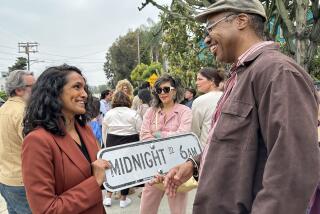You Don’t Have to Hate Gays to Keep Loving Colorado
- Share via
H8 ST8.
A lot of people glibly proclaim that to be the official vanity license plate for the state of Colorado after its voters passed Amendment 2 last November. The amendment, which won with 53% of the vote, excludes sexual orientation as a category for protection against discrimination in housing, employment or public accommodations.
It was specifically directed against local ordinances in Denver, Boulder and Aspen that included gays in their “protected” groups. Amendment 2 sponsors said gays had been receiving “special” rights to which they weren’t entitled.
Amendment 2 opponents interpreted the state vote as an invitation to discriminate against gays. Counterpunching quickly, they began a boycott of Colorado, believing that if the Hate State felt an economic pinch, it would reverse itself.
If I were marshaling the gay-rights forces in the country, I would forget about boycotts and concentrate on the much more pressing matter at hand: winning the hearts and minds of people. The Colorado vote has convinced me this is a much more difficult task than I once thought.
Colorado the Hate State? Hardly.
I lived in Denver for nine years, until the mid-1980s, and Colorado isn’t a Neanderthal state or one with a bent against progressive thinking.
I say that not as an apologia for the state but because it’s important that gay-rights supporters not fall into the trap of thinking their opponents are automatically hateful or unenlightened. Surely some are, but it doesn’t account for a 53% vote in Colorado, and to misunderstand the opposition in any struggle is a mistake that can be fatal.
What happened in Colorado could happen in California.
Consider Colorado for a moment. It is a state with Democratic, Republican and Independent registrations divided into nearly equal thirds.
Like California, it has its liberal bastions and its redneck enclaves. Like California, it has ever-competing factions of developers and environmentalists. Like California, it has a western spirit of individualism and “live-and-let-live” philosophy. Like California, its people don’t want the government prying into bedroom windows.
This is a state that sent Democrats Gary Hart and Tim Wirth to the U.S. Senate in the 1980s and that has had Democratic governors since 1974. The mayor of Denver is black, and he followed a two-term Hispanic mayor, Federico Pena, soon to be in President Clinton’s Cabinet. On the same day that Colorado passed Amendment 2, it favored Clinton over President Bush and elected Ben Nighthorse Campbell, an American Indian who won his U.S. Senate race against a Republican opponent.
In short, Amendment 2 wasn’t passed by a right-wing phalanx that sneaked in while no one was watching to win a fluky victory.
Will Perkins, a 64-year-old Chrysler dealer in Colorado Springs, spearheaded the Amendment 2 drive. I talked to him on the phone Tuesday, and he discussed the issue with none of the vituperation or turn-off language that you can always count on from Orange County’s own Rev. Lou Sheldon or others who turn gay-rights issues into holy wars.
For that reason, Perkins is much more formidable. “In Colorado, the spirit of this thing is and was throughout the campaign that homosexuals have equal rights if they’re American citizens and nobody, at least the vast majority of people, has a problem with that,” Perkins said. “Where the problem comes is when the homosexual community wants something special because of the way they have sex. That’s where the problem is, and that’s where Colorado says enough is enough.”
The Perkins forces needed 50,000 signatures to get the measure on the ballot; they got 85,000. They lost only 14 of Colorado’s 63 counties.
Are you saying that gays aren’t discriminated against? I asked Perkins. How is what they’re asking any different from protection given other minorities?
“They (other groups) got protection because it’s a class of people (that were discriminated against). They showed they needed it. That’s where the difference of opinion is. . . . We put it this way: There are a lot of good reasons for special civil rights. How you have sex isn’t one of them.”
Perkins conceded that as individuals, gays may be treated unfairly, but he argued that heterosexuals are too, and that both groups have equal protection under the law. He said gays, as a class of people, are a highly educated, well-paid group in society that hasn’t suffered systemic discrimination such as blacks did in the Deep South before federal laws protected them.
So, what does this mean for gay-rights supporters?
It means that when the issue comes around in California, they must not label the opposition as homophobes or bigots. They must not threaten the state preemptively with a boycott (as a practical matter, you can’t boycott California). They must show, in very human terms, that they sometimes are denied access to housing or job security--and, therefore, their fundamental rights as human beings--simply because of their sexual orientation.
Whether he admits it or not, Perkins and his soft-spoken supporters have an anti-gay agenda. The very name of their group--Colorado for Family Values--tells me what they think of gay people.
But they succeeded in winning over a state that isn’t made up of bigots. I expect a similar approach in California, and if gays are to win that fight, they must convince people they are in the legal and moral right.
In announcing his opposition to the Colorado boycott, actor Raymond Burr, whose revived “Perry Mason” series is filmed in Colorado, was quoted in the Denver Post as saying: “You fight bad legislation by working within the system to change it. You don’t boycott; you don’t walk away. You educate people. You get those who care involved and attempt to change things.”
You know Perry Mason’s track record. Trust him.
More to Read
Sign up for Essential California
The most important California stories and recommendations in your inbox every morning.
You may occasionally receive promotional content from the Los Angeles Times.










